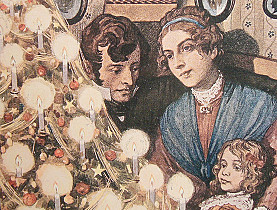“Christmas invites us to welcome others”

Brother Richard of the ecumenical Taizé Community in France says Christmas gives a message of hope and "invites us to accept each other without prejudice".
Swiss-born Brother Richard is helping to organise a European gathering for young people in Geneva in the lead-up to New Year.
The meeting is expected to bring together up to 40,000 people from across the continent for spiritual prayer and meditation from December 28 to January 1.
Brother Richard, who grew up in a town outside Bern and was raised as a Protestant, spent a month in Taizé, in the French region of Burgundy, as a volunteer in 1978. He subsequently became a member of the community and later vowed to live the life of a monk.
He says he has met people from many countries and different religious and professional backgrounds. A place for young people who live their faiths in different ways had an enormous appeal for him.
Brother Richard says he found something in Taizé that didn’t exist in Switzerland at the time. For him, faith means forging friendships, sharing and reconciliation.
swissinfo: The ecumenical spirit of Taizé does not to appear to be spreading as much as it used to. In fact the opposite is true: tensions between the Christian churches and between different religions are increasing.
Brother Richard: Unfortunately our history often catches up with us. Our connections with our roots are very deep – that is a wonderful thing, but it obviously complicates relations. Today we still have a great need for solid contact between people of different religions in order to increase our trust.
Only then can we begin to discuss the thorny issues without getting excessively emotional and without the mutual fear that distorts everything. Religion must not transform itself into an ideology but must instead draw its meaning from life. If we succeed in that, we can open our eyes to others and banish intolerance from our lives.
swissinfo: But this was also the aim of the previous 30 meetings that you have organised.
B.R.: Every meeting and exchange is very important, seeing that in Europe our society is increasingly multi-religious. It’s not about everyone being equal – instead of considering others as a threat, we should learn to see them as an enrichment to our lives.
These meetings are a concrete chance to experience these signs of hope.
swissinfo: Young people no longer seem to be particularly sensitive to religious issues. How do you manage to attract 100,000 of them to Taizé every year?
B.R.: The Taizé Community is above all very welcoming. Everyone can come here as they are – with their doubts, uncertainties and problems. There is a great respect for everyone and we don’t ask anyone to deny their religion.
The prayers and the moments of silence enable young people to experience something as a community, to detach from a rapid pace of life and to find a bit of time for themselves. Everyone is in touch with, but also at the service of, others.
swissinfo: Turning to Christmas, does it still have any meaning if it is celebrated as it generally is nowadays?
B.R.: It’s true that Christmas is in large part a commercial event. A few days ago I read a quote saying “Christianity might disappear, but Christmas will definitively remain”.
I think however that in certain families Christmas also means acts of kindness, often without a direct link to religion.
swissinfo: What does Christmas mean to you?
B.R.: For me, Christmas feels like a special moment when God visits us.
When Jesus was born in a stable, nothing had been prepared to welcome him. At Christmas, God comes to see us without demanding that we are ready to receive him. He accepts us as we are, in our human condition, without condemning us.
Christmas is therefore a message of hope and peace that invites us to put to one side our intolerance and to welcome other people. Without condemning them.
swissinfo-interview: Armando Mombelli
The Taizé community was founded by Roger Schutz, who later took on the name of Frère Roger (Brother Roger). He was its leader until his death in 2005.
He left Switzerland in 1940 to live in the village of Taizé in Burgundy, France. He provided shelter for refugees during the Second World War, orphans and people in need.
The community is made up of more than 100 men from various nations representing Protestant and Catholic branches of Christianity.
An estimated 100,000 people visit Taizé – a destination for Christian pilgrimage – every year to join in the community life.

In compliance with the JTI standards
More: SWI swissinfo.ch certified by the Journalism Trust Initiative











You can find an overview of ongoing debates with our journalists here . Please join us!
If you want to start a conversation about a topic raised in this article or want to report factual errors, email us at english@swissinfo.ch.